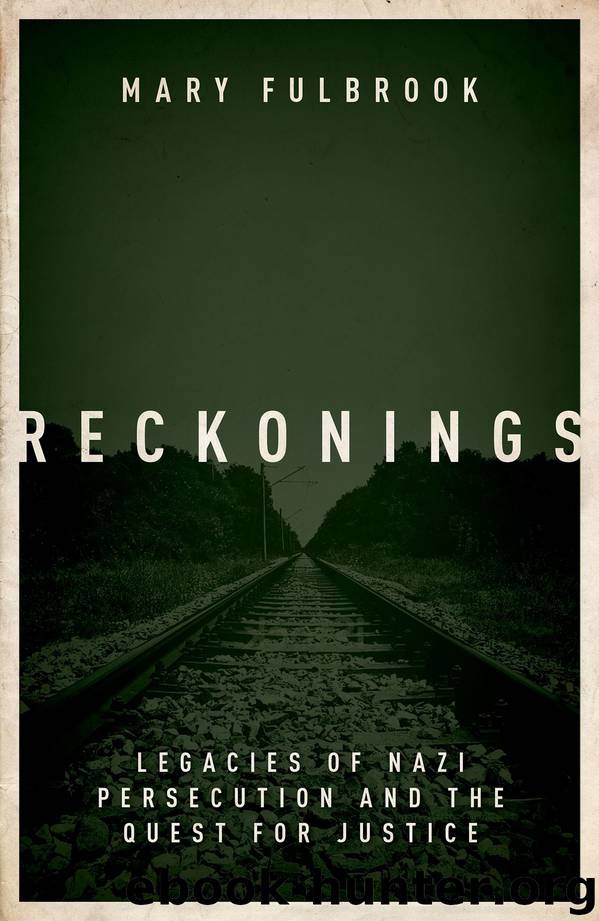Reckonings by Mary Fulbrook

Author:Mary Fulbrook
Language: eng
Format: epub
ISBN: 9780192539298
Publisher: OUP Oxford
Published: 2018-08-01T16:00:00+00:00
The Commandant of Mielec: The Fading Significance of Victim Testimony
In March 1990, following the collapse of communist rule in the GDR but prior to the unexpectedly rapid unification with the Federal Republic seven months later, the sorry state of the twenty-three remaining Nazi prisoners languishing behind bars in East German prisons came to the attention of the West German news magazine Der Spiegel.73 At one extreme, a prisoner had been held for thirty-four years; in the case of the most recent conviction, just a few months of the sentence had been served. In the journalist’s view, the fact that some Nazi perpetrators who had been given life sentences did indeed remain in prison for life was yet more evidence of the intrinsic inhumanity of the GDR and the politically biased character of its legal system. According to the Spiegel article, the SED regime needed the continued imprisonment of “its Nazi henchmen in order to document the cleanliness of the East Republic for the whole world.”74 Some of these prisoners were serving life sentences and would perhaps have been executed in an earlier era when the death sentence was still in use. Whether or not they might have deserved their punishment—as was considered to be the case with Schmidt—was apparently not as important as the alleged abuse of justice for purposes of building an international political reputation. The Spiegel article stressed the inhumanity of the sentences in view of the age and ill-health of these former Nazis. Yet again, the voice of the liberal democratic West appeared to be more concerned about the well-being of those who had inflicted death and suffering than with justice for their victims.
Even some forty-five years after the end of the war, the competition between East and West for the moral high ground was still being played out over the treatment of former Nazis. Where one state claimed moral superiority through greater stringency in dealing with perpetrators and overcoming the past, the other claimed moral superiority in greater mercy and humanity shown to precisely those perpetrators.
This was not the end of the story of German attempts—on the whole, failed ones—to do justice to the Nazi past in the courtroom. Trials of just a few elderly individuals took place in the 1990s, after the unification of Germany. These trials effectively marked not only the end of the rivalry and distinctions between East and West German systems of justice but also the petering out of the age of confrontations between persecutors and persecuted. Cases drizzled on, before a surprising legal twist, one that came too late to make any difference at all to the pursuit of justice on behalf of the millions who had been persecuted and murdered.
Another trial relating to southern Poland illustrates the shift in emphasis. The former commandant of the labor and concentration camps of Przemyśl and Mielec, Josef Schwammberger, was finally put on trial in Stuttgart in 1991–92, nearly half a century after he had committed atrocities across southern Poland, including in Stalowa-Wola, assisted
Download
This site does not store any files on its server. We only index and link to content provided by other sites. Please contact the content providers to delete copyright contents if any and email us, we'll remove relevant links or contents immediately.
The Pirates of Somalia by Jay Bahadur(1640)
Political Theology by Carl Schmitt(1585)
The Holocaust: A New History by Laurence Rees(1526)
The Social Animal by David Brooks(1459)
A Practical Guide to International Arbitration in London by Hilary Heilbron(1440)
Restitution by Restitution(1427)
Pirates of Somalia by Jay Bahadur(1386)
Coercing Virtue by Robert H. Bork(1359)
The Nuremberg Interviews by Leon Goldensohn(1307)
Basic International Corporate Taxation by Sebastiano Garufi(1218)
A History Of Thailand by Baker Chris(1197)
International Trade and Business: Law, Policy and Ethics by Gabriël Moens & Peter Gillies(1152)
The Global Commons by Susan J. Buck(1140)
Blood Profits by Vanessa Neumann(1121)
Asian Waters by Humphrey Hawksley(1116)
The Sovereignty of Human Rights by Macklem Patrick(1114)
Spring Fever: The Illusion of Islamic Democracy by McCarthy Andrew C(1110)
The Nuremberg Trials: The Nazis and their Crimes Against Humanity by Roland Paul(1054)
Crimes Against Humanity: Historical Evolution and Contemporary Application by M. Cherif Bassiouni(1030)
